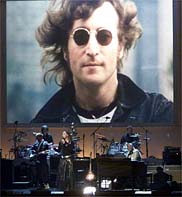October 5, 2001
Imagining John Lennon, in a Time of Anguish
By JON PARELES
 |
| (G. Paul Burnett/The New York Times) |
| The gospel artist Yolanda Adams singing "Imagine" at Radio City. The former Beatles sideman Billy Preston played organ (front, on the right). |
When the TNT cable channel planned "Come Together," its tribute to John Lennon, the show was going to be a benefit for gun-control groups, a concert "in support of a nonviolent world." After the terrorist attacks of Sept. 11, it inevitably changed. The rescheduled concert, which was broadcast live on Tuesday night from Radio City Music Hall on the WB network and on TNT, became a benefit for relief efforts through the Web site www.helping.org.
Lennon's yearning to give peace a chance, and his conviction that "love is the answer," made an uncomfortable fit with the prospect of imminent war. Instead, the tribute found a new focus: mourning both a murdered musician and the thousands of victims in New York and Washington.
Its avowed purpose became, in the words of the show's host, Kevin Spacey, "to not only keep John's songs alive but to help rebuild New York." The most touching moment was broadcast from Central Park, where Cyndi Lauper sang "Strawberry Fields" next to the memorial to Lennon, with circles of candles flickering on the mosaic that reads, "Imagine."
The set for the show was based on the white room where Lennon made the video for "Imagine" and included a white grand piano like the one he used. At the music hall, concertgoers saw Lennon's home movies and heard his music during the broadcast's commercials.
"Imagine" itself, belted by the gospel singer Yolanda Adams with the onetime Beatles sideman Billy Preston on organ, sounded newly prescient and poignant in its longing for an end to countries, religions and possessions, with its utopia as distant as ever. It was just one moment in which an old song adapted to a new historical moment — a testament both to the wise generality of Lennon's writing and to fans' willingness to place themselves within a song.
Actors including Dustin Hoffman, Ben Stiller, Leelee Sobieski, Steve Buscemi and Benjamin Bratt condemned the attacks and praised heroic rescue workers and the city itself. Punctuated by videotaped interviews with Lennon, they cast his songs as dreams of a one-world community and transmutations of pain into beauty. Behind the performers, video screens showed New York scenes, hard-working firefighters and American flags.
Many of Lennon's songs are filled with a sense of private loss that has now taken on a public resonance. When Dave Matthews gently sang "In My Life," its "places I'll remember . . . Some have gone" seemed utterly specific. The hallucinatory itinerary of "Lucy in the Sky With Diamonds," sung by Marc Anthony, became a New York travelogue, with all its whimsicality vanished. When Nelly Furtado and David Stewart performed "Instant Karma," its peak came with Ms. Furtado trumpeting "surely not to live in pain and fear." And Natalie Merchant sang "Nowhere Man" without a hint of its original disdain, turning it into a folk-rock lullaby for someone bewildered and displaced.
The program's original character, as an all-star musical tribute, emerged now and then. Mr. Spacey had a moment of celebrity karaoke, singing "Mind Games" as a finely detailed Lennon impression. Stone Temple Pilots did their own Lennon imitation as they replicated the Beatles' fuzz-toned "Revolution." Sean Lennon, Lennon's son with Yoko Ono (the show's executive producer), harmonized with Rufus Wainwright on Lennon's "Across the Universe" and "This Boy," and sang "Julia" alone, his voice a lighter echo of his father's.
Lou Reed made "Jealous Guy" completely his own, a volatile rocker that turned each verse into a cycle of tongue-tied bewilderment, fury and partial apology, warning, "I'm a jealous guy — watch out!" Alanis Morrissette gave "Dear Prudence" a touch of Eastern drone and mysticism. Shelby Lynne, who lost her own parents to violence, sang Lennon's primal "Mother," though the large band led by Dave Stewart made it sound strangely triumphant rather than lonely.
Craig David, an English pop-soul singer, dared to add some words to Lennon's own in "Come Together," with a quick-tongued rap that acknowledged, "It's real hard to try and say goodbye when it feels like yesterday" and "the heroes are the real superstars." The reggae singer Shaggy introduced "Give Peace a Chance" with another rap calling for "no more terror, no more wars," and added, "It's peace we need." But "Give Peace a Chance" soon segued to another, more pugnacious Lennon song: "Power to the People" — a sentiment from the 1960's that awaits its 21st-century meanings.
Copyright 2001 The New York Times Company
![]()